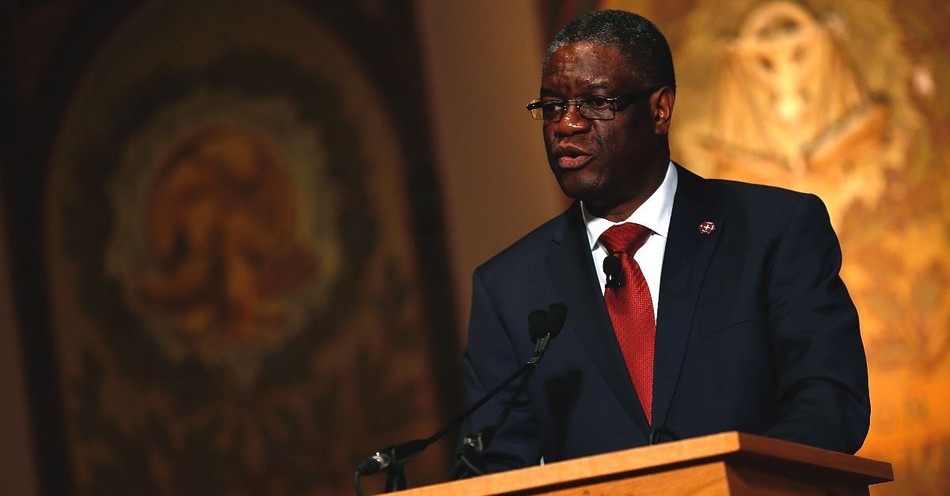What happens when you spend your life to running into the crisis? Sometimes you win the Nobel Peace Prize.
It’s “Nobel Season,” the week-long period when the winners of the Nobel Prizes are announced. Most of us have to take the Academy at its word when it says that the winners in fields such as physics, chemistry, and medicine and physiology are worthy of the honor.
But the Nobel Peace Prize? That’s different. Ordinary, informed people can recognize questionable winners—no, I’m not to going cite any examples—and, more importantly, deserving honorees.
This year’s winners, Nadia Murad and Denis Mukwege, are definitely deserving.
Murad is a Yezidi woman who was enslaved by ISIS and repeatedly raped and tortured. After a near-miraculous escape, she made her way to Germany, where she campaigned against what the Nobel Committee called “the use of sexual violence as a weapon of war and armed conflict,” in the Middle East and around the world.
Murad’s remarkable and inspiring story befits a remarkable and inspiring woman.
The other recipient is Dr. Denis Mukwege, a surgeon from the Congo.
To understand Mukwege’s story, you need to know a little about the recent history of the Congo and central Africa more generally. In 1996, Rwanda invaded the eastern part of the Congo. While the ostensible reason was to eradicate the remaining forces responsible for the Rwandan genocide two years earlier, that reason was soon forgotten in what came to be called “Africa’s World War.”
Nine countries and twenty-five militias fought for control of all or part of the Congo and its mineral riches. By 2008, an estimated 5.4 million people had died, and countless women had been sexually assaulted as a military tactic.
While control of the Congolese government is no longer in doubt, an enduring legacy of the conflicts in the region is the use of rape as a weapon of terror.
Let me be clear: Rape as a weapon of war is not limited to Central Africa. It is as old as warfare itself.
But what sets Central Africa apart is Denis Mukwege. In 1999, the French-trained surgeon opened the Panzi Hospital in the country’s most war-torn region. Since its opening, the hospital “has treated more than 85,000 patients with complex gynecological damage and trauma, an estimated 60 percent of injuries has been caused by sexual violence.”
Mukwege, who has been dubbed “the man who mends women,” is a ferocious critic of those who perpetrate sexual violence and the governments that stand idly by. In September 2012, in a speech at the United Nations, he criticized the Congolese government and others for failing to stop what he called “an unjust war that has used violence against women and rape as a strategy of war.”
His words struck a nerve: When he returned home, armed men attacked his home, killing his bodyguard and taking his children hostage. He escaped and went into exile long enough to recover from his injuries but returned to the Congo two months later.
Why does Mukwege run towards the danger when the “sensible” thing would be to run away from it? You can probably guess: his Christian faith. The son of a Pentecostal pastor and a minister himself, Mukwege was inspired to pursue medicine watching his father pray for the sick.
As his advocacy shows, his mission goes beyond medical care. Speaking before the Lutheran World Federation, he said that “It is up to us, the heirs of Martin Luther, through God’s Word, to exorcise all the macho demons possessing the world so that women who are victims of male barbarity can experience the reign of God in their lives.”
Mukwege joins Leymah Gbowee of Liberia as recent African Christians who have been awarded the Nobel Peace Prize for their efforts in restoring what human sin and evil have broken.
Award or no award, this is, as Mukwege puts it, the “mission entrusted to us by Christ.”
BreakPoint is a Christian worldview ministry that seeks to build and resource a movement of Christians committed to living and defending Christian worldview in all areas of life. Begun by Chuck Colson in 1991 as a daily radio broadcast, BreakPoint provides a Christian perspective on today’s news and trends via radio, interactive media, and print. Today BreakPoint commentaries, co-hosted by Eric Metaxas and John Stonestreet, air daily on more than 1,200 outlets with an estimated weekly listening audience of eight million people. Feel free to contact us at BreakPoint.org where you can read and search answers to common questions.
John Stonestreet, the host of The Point, a daily national radio program, provides thought-provoking commentaries on current events and life issues from a biblical worldview. John holds degrees from Trinity Evangelical Divinity School (IL) and Bryan College (TN), and is the co-author of Making Sense of Your World: A Biblical Worldview.
Publication date: October 9, 2018
Photo courtesy: Getty Images/Win McNamee/Staff




.jpg)